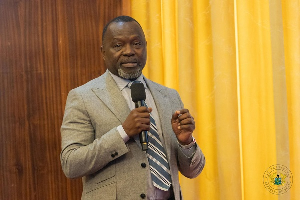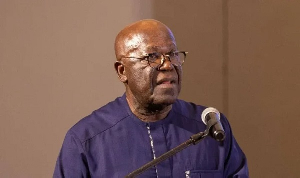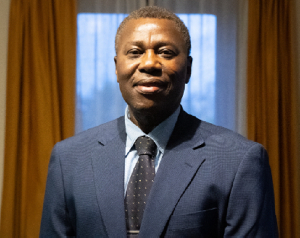Not too long ago Dr. Kwesi Botchwey is on record to have stated that, the NDC was not bereft of ideas in solving the challenges facing the economy. In another twist, he is moaning about partisan politics killing sensible policies. I can't get it.
Another outburst from Haruna Iddrissu states that the NPP is bereft of ideas and that it is not a repository of knowledge also irks the ear and understanding. Therefore what is the Government seeking? Conflict or Consensus!
Sincerely speaking I'm at my wit end. Many communicators from the NDC are at war with the opposition NPP for their failure to add to the numbers to the much hyped National Economic Forum.
Reverend Martin Luther King, Jr. writing from jail had this to say: “We who engage in nonviolent direct action are not the creators of tension. We merely bring to the surface the hidden tension that is already alive. We bring it out in the open where it can be seen and dealt with. … Injustice must be exposed, with all of the tension its exposing creates, to the light of human conscience and the air of national opinion before it can be cured.”
When dignity is violated, the response is likely to involve aggression, even violence, hatred, and vengeance; the human connection is the first thing to go. On the other hand, when people treat each others with dignity, they feel their worth is recognized, creating lasting and meaningful relationships. Surprisingly, most people have little understanding of dignity. While a desire for dignity is universal, knowing how to honor it in ourselves and others is not the issue but it is of great consequence.
In a multi-party democratic system no consensuses exist. The reasons are well-known and need not to be rehashed. Is the NPP right in taking such stand? From all indication the Party is right. There is “No Consensus Winner or No Consensus Loser”.
I think the NPP is right for not to sleepwalk into this new found concept of consensus building.
Let's consider this scenario. We are having a birthday party and half of the children want to go to the zoo and half to the park. So we separate the two groups, give them sticks and let them fight it out. Whichever group wins, can make all the decisions. Would you do that?
Well, why not? That is how multi-party democracy is all about. Most of us fail to grasp the underlying bend, that's the ideological inclinations. Our population is firmly divided on the basis of some ideology from which we fight; Socialists and Capitalists.
We must recognize that in a Multi-Party Democracy, there is no room for cooperation or consensus. We don't talk; we fight. I win, you lose. That is the system - inherently it is not based on harmony and consensus but on conflict.
Are we refusing to acknowledge what the opposition is normally told? "Too Bad You Are The Losers", and that, we play the piper and you have to dance to music. So, why the cry for consensus? We seem to be on the back pedal looking for an escape route. Forgetting that it is the cornerstone of the democratic system that, the 'winners' control everything and the 'losers' are totally marginalized.
In a political society like ours there is little apparent concern for the losers. After all, they are the losers and their wishes are unimportant - even though they often form 60% or more of the population.
Looking at it critically, multi-party democracy is the only government and governance system in the world designed to disenfranchise, isolate and betray at least half of the population. Perhaps that is why sometimes 70% or more of the population does not bother to vote.
Unfortunately for democracy, the deliberate cleavage of our societies - for purposes of politics - was done according to perhaps the most inflammatory of human characteristics, an irreconcilable simian-theological divide, creating two factions perpetually at each other's throats.
We have many names for the ideological teams: Liberal, Conservative, Labor, Capitalist, Democrat and Republican. We sometimes refer to them as the Left Wing and Right Wing, or Socialists and Corporatists. In Ghana the leanings is between the Nkrumaists and the Domos.
But the division is more sinister than these names suggest. This ideological rift that has been created for the sake of politics is really between the ideological left and the Christian right - between the pacifists and the war-mongers.
And it appears that, though I make no claim to Sociological credentials, human society, at least Western society, will automatically cleave along these lines if given a fertile chance.
What sane person would consciously divide a population based on this ideology? What would possess us to make that choice?
It would seem that the reason cannot be overcome by a passion, against its knowledge. For the stronger is not overcome by the weaker. Now knowledge, on account of its certitude, is the strongest thing in us. Therefore it cannot be overcome by a passion, which is weak and soon passes away.
Most of us have insatiable Passion that, we bid Good-Bye to Reason. It is not easy to explain or understand the causes of the often vehement enthusiam with which many in our society embrace their political convictions. It often seems as violent and passionate as some Fanatics or Supporters supports their football teams, frequently resulting in physical violence.
Often times we are bombarded with junk from persons society claims they are literate of some values which must be tapped. I'm afraid most are not, they are the source of friction, arousing the already agitated environment. Just think of the garbage spewed by Professor Agyemang-Badu Akosa. Highly inflammatory! Question the rationale of remarks and one won't be wrong to brand him as someone with no quality. His ideological bent exposes him outright.
We can conclude only that this separation, this cleavage of people according to their propensity for war-mongering must involve some of the deepest and most primitive instincts and emotions of the human psyche. The combination of whatever is here, is not only potentially explosive, but essentially mindless - a kind of yearning herd mentality with a propensity for violence.
It is clear that politics, in the real sense, is seldom guided by reason. Reason can accommodate and withstand discourse; ideology on the other hand, cannot.
Politics, religion, and team sports have a common root in our psyche. None can be discussed intelligently for very long; all raise violent emotions; all suffer from ideology that is blind to fact and reason.
Religion like Politics is a Team Sport, Too. It can be easily identified that, all of the primitive psychological attractions of "Partisan" democracy exist in religions. People don't join a political party from a commitment to good government, and they don't join a religion to learn about God. In both cases, they do it to join a 'winning team'.
The Base Attraction of Democracy is Conflict and not Consensus. The ideological separations serve not to do good, but only to create conflict. And that conflict is not the same as what we might term 'healthy competition'.
Political conflict is exclusive, sometimes vicious, very often dishonest, forcing people to go against their own consciences and the good of the nation for the sake of the party.
The ideological rifts inherent in party politics have been introduced into Western government - either naturally or by design - solely and precisely because they induce the conflict so necessary to any team sport. How can we have a competition if everyone is on the same team, just trying to get the job done? When and where does “Consensus” raise its head?
The inescapable conclusion is that Multi-Party democracy - politics, in fact - exists not to select good government but to permit the masses to participate in a primitive, socio-theological rite of competition, conflict and victory. It is a useful substitute for a civil war.
Conflict Creation and Resolution are Partners. In the individualistic, black and white Western societies, the multi-party democratic process is in no way intended as a method of problem resolution. It is instead consciously contrived precisely because it creates the problem, setting the stage for open conflict and a 'law of the jungle' political battle.
The conflict resolution portion of this masquerade is the forced voting, which appeals to Westerners because it is the only system short of physical battle that can resolve the issue on an all-or-nothing basis, creating the winners and losers these societies need.
As stated in earlier paragraphs, in a multi-party democratic system no consensus exits. It is all a "Cruel Hoax". "The People" are lured into choosing sides, engaging in battle, and then forced into a patently unfair resolution by voting. Why are we advocating for "consensus"? What type of government does the country operate, "Multi-party democratic or Consensus democratic"?
Society must be spared of this cruel hoax about consensus building. Parties are elected based on ideological bend and manifestos. The NDC was elected to form the government, governed on the basis of its manifesto therefore why are they asking for a consensus.
The losers have been browbeaten, bullied, propagandized and hoodwinked into believing and accepting that, because they are the losers, their wishes, rights and welfare are now irrelevant and they must remain silent.
To the victor goes the spoil. You lost the war; I set the terms. The winners, sated with the thrill of victory, are now also irrelevant, and the elites - and the parties they control - continue to remain in charge as they always have, while the people believe they are supreme.
In fact, 'the people' are merely cannon-fodder in a pseudo-religious battle, joining the team, supporting, paying, protesting, yelling and screaming and, finally, voting. But then the game is over, everyone returns to their senses and their jobs and lives, and the elites continue with their agenda of controlling the government and running the country. Nothing has changed.
The absurdities we are made to believe - Freedom! Democracy! Human Rights! Is nothing but absolute false. Many people will tell us - often, at the top of their lungs - that the multi-party government system is about "freedom" and "choice" and is "real democracy".
But the multi-party system is not about freedom and choice, and it is not about either democracy or government. It is about social conflict and competition, about playing in a team sport.
In a multi-party democracy, the "game" is not good government but the election process itself. After my team "wins" the election, the game is over and we all go home. And we absolve ourselves of any responsibility for what "the players" - either the voters or the elected representatives - do after the game is over.
And that is the reason government leaders, incompetent as they tend to be, are almost never held to account for their actions.
The Medium is the Message. In such practice, it is 'politics' that is the attraction, not 'government'. I sincerely doubt that many people who are active in the political process give even a single thought to the quality of government that will emerge. Their only focus is winning the game for their team.
The process has become so corrupted that democracy does not even pretend to refer to the quality of government that might ensue as the end result after an election. And this is because the end result is the process itself - the competition, winning the election, nothing more.
The Ghana's democratic system is universally recognised today, but it can be said that it is the most dysfunctional government presently.
One of the more distressing congenital deformities of our politics is that by the time all the special-interest groups - the lobbyists, party members, financiers, bankers and flakes have grabbed their share, nothing useful is likely to remain for the common good.
The outcomes are preordained beause elected politicians and public officials are too busy looking after their interest, of Party Supporters and the big multi-nationals, to worry about the people and the nation.
The welfare of the voters unfortunately doesn't enter into these discussions. If they did, do you think the Ghana government would have spent billions on SADA, SUBA, GYEEDA and other bailout out instead of the people?
Ghana-style Multi-Party Democracy is a formula for waste, inefficiency and corruption. It is the one form of government that will guarantee decisions will be made to benefit private interest groups instead of the country as a whole.
We can't fathom the depth of inefficiency and corruption, as "The Hole is too Deep". How did the supposedly-great concept of participatory democracy descend to such a pathetic level?
The fundamental issue is that, our type democracy changed its objective from selecting an outstanding leader, to one of winning a game in a team-sport competition.
That is entirely the fault of the introduction of multi-party politics into government, and it is too late to reverse course; we cannot return to the beginning and start again.
To do so would require a social upheaval equivalent to a popular revolution, any government would viciously put down any such attempt.
In spite of all the propaganda to the contrary, no democracy would permit 'the people' to actually gain control of their government to the extent of intelligently hiring managers to serve rather than ignorantly choosing masters to rule, because in a multi-party democratic system there is no room for consensus.
Opinions of Sunday, 18 May 2014
Columnist: Akwah, Nana














